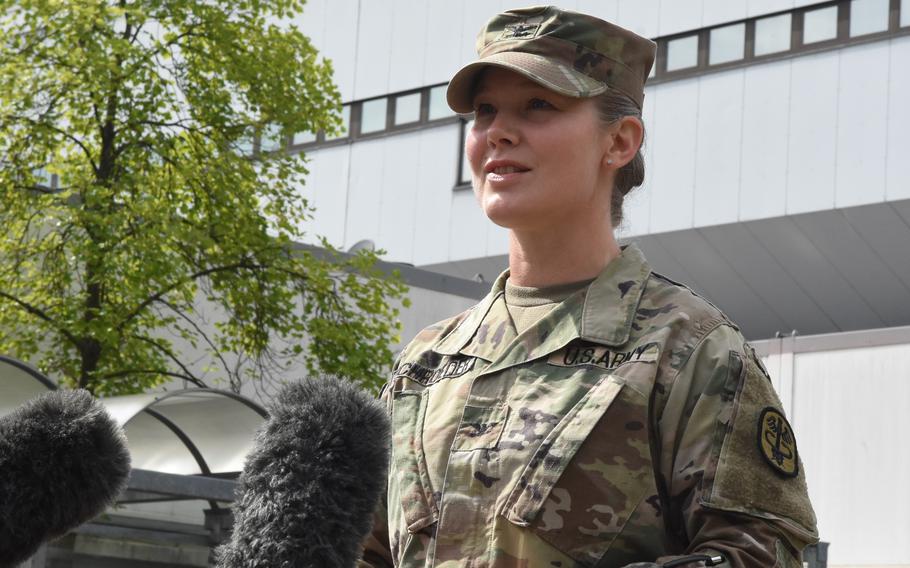
Army Col. Jodelie Schroeder, the chief nursing officer at Landstuhl Regional Medical Center, Germany, spoke Aug. 31, 2021, about the flood of emotions and pride she felt while caring for U.S. service members injured in the attack outside the airport in Kabul, Afghanistan, last week. (Jennifer H. Svan/Stars and Stripes)
All 20 U.S. service members who were injured in the terrorist attack last week in Afghanistan and later were treated in Germany have returned to the United States for further care, military officials said Tuesday.
Doctors and nurses at Landstuhl Regional Medical Center, the U.S. military’s largest hospital overseas, stabilized the patients, many of whom arrived in critical condition with a range of shrapnel and gunshot wounds, officials said.
The last group to be medically evacuated to Walter Reed National Military Medical Center in Bethesda, Md., left on Monday.
“Every single service member that received care here left our facility in much better condition than when they arrived,” said Col. Andrew Landers, the LRMC commander.
Whether they make a full recovery depends on what “happens over the next four to six weeks in their treatment and recovery process,” he said.
LRMC also treated about a dozen Afghan evacuees who were injured in the Kabul airport attack and medically evacuated. Most of them are still receiving care at the hospital, officials said.
Landers did not share personal details about the injured. But officials said the U.S. military members are young, similar to the demographics of the personnel killed in the attack, whose ages ranged from 20 to 31. A few women are among the injured.
Most had shrapnel injuries, fractures and penetrating wounds “consistent with what you see in any type of blast,” Landers said.
Some had gunshot wounds, said Col. Peter Kim, an Air Force physician and the chief medical officer at LRMC. There were reports of gunfire during the attack, in which a suicide bomber detonated explosives near a checkpoint manned by U.S. military personnel.
Some of the patients received interventions during the 8.5-hour medical evacuation flight on military aircraft from Kabul that saved “life, limb and eyesight as much as possible,” said Air Force Col. Irene Folaron, commander of the 86th Medical Squadron at Ramstein Air Base.
When the service members arrived at LRMC, doctors and nurses were preparing for the worst, Kim said.
“We weren’t getting a lot of good information, just because of the size of what happened,” he said.
When the first patients arrived Friday, more than 100 staff members from across all hospital departments waited with gurneys and offers of support, Kim said.
“The energy was palpable,” he said.
Other military units in Europe and German military and civilian medical officials also provided support. The 86th Medical Group at Ramstein helped with supplies, and the Army sent a team of linguists and special forces medics to help.
RAF Lakenheath also sent two providers to assist, and German trauma centers provided expertise, Landers said.
Army Col. Jodelie Schroeder, LRMC’s chief nursing officer, grew emotional when talking about the injured service members. An Army nurse corps officer for 24 years, Schroeder was a brigade combat team nurse in Iraq.
“Those are the kind of feelings for me that are coming back,” she said. “They know that from a military medical standpoint that we’re here, we’ve got their back.”